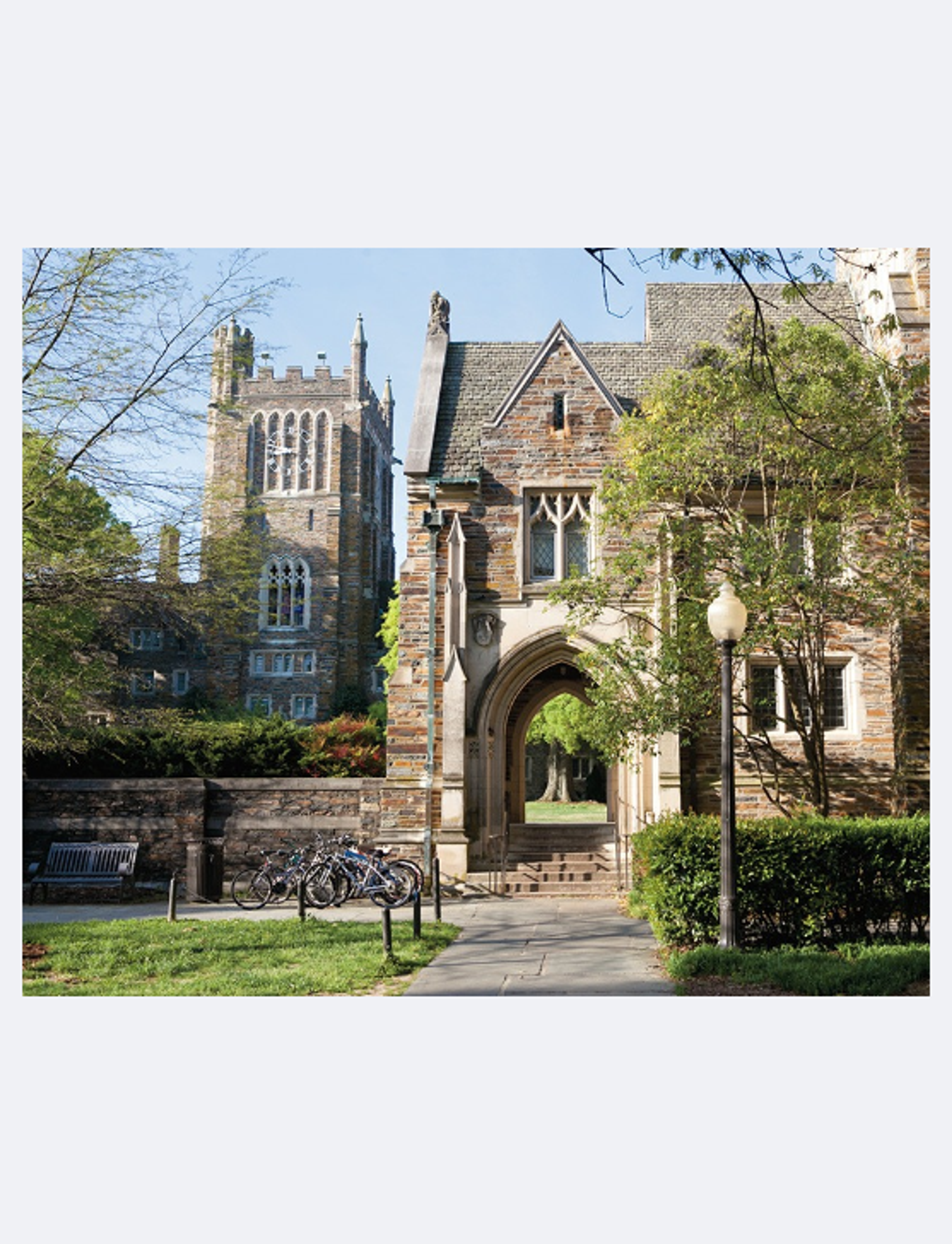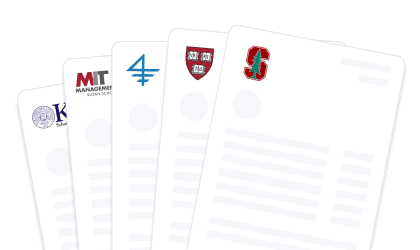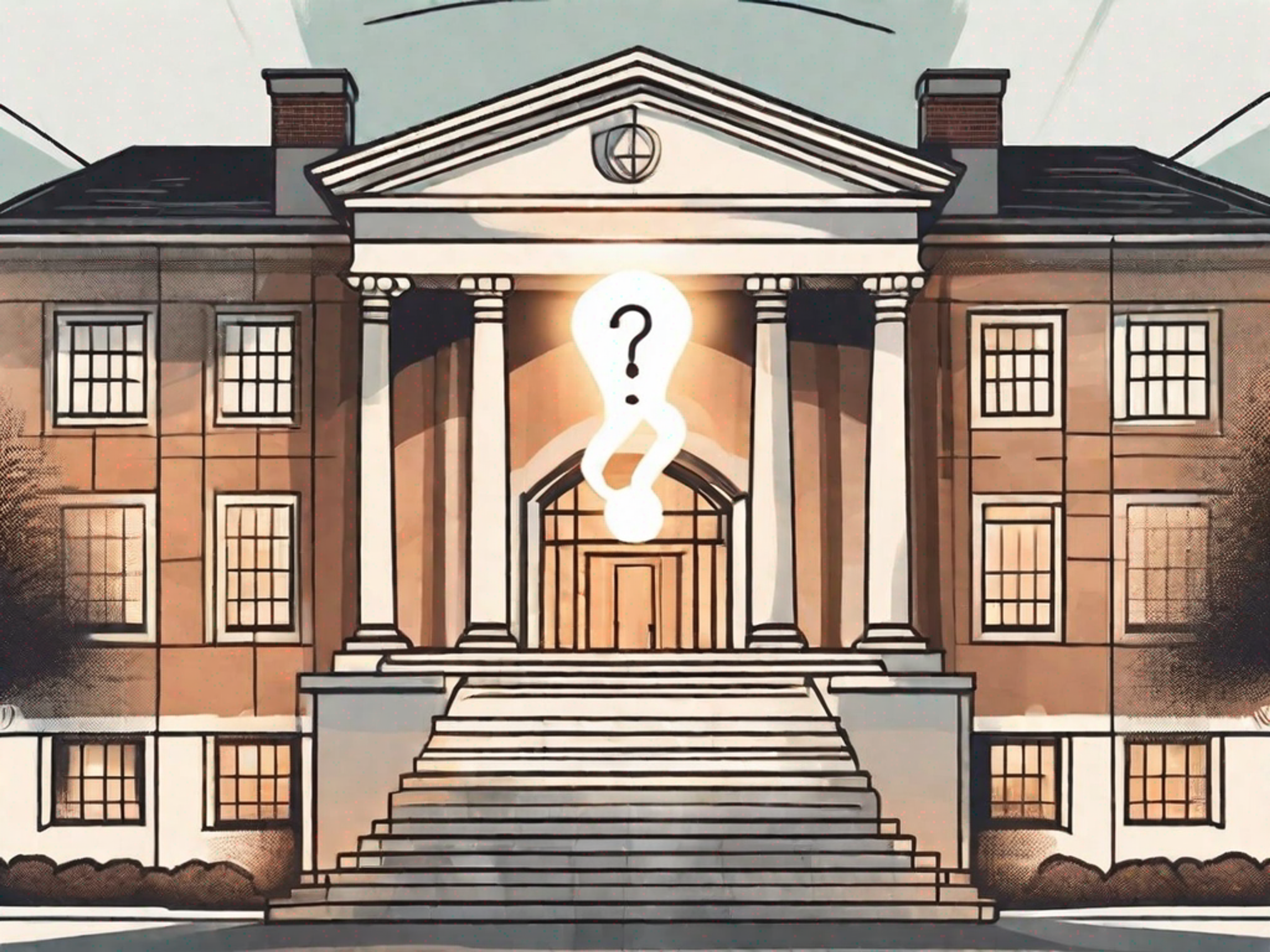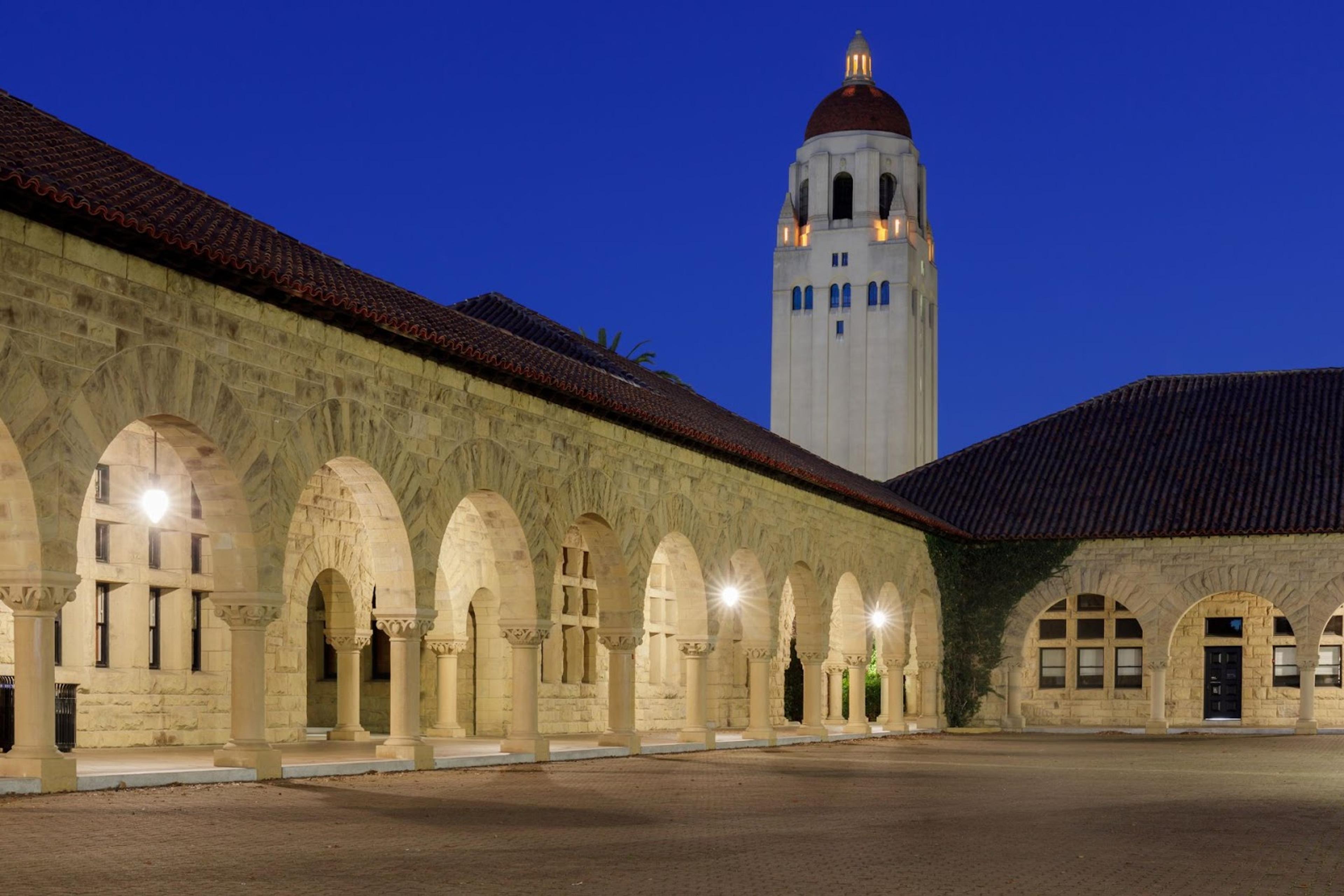How to Nail Your Duke MBA Interview: Overview, Questions, & Tips
Get insider tips from a Duke Fuqua alum and former Admissions Fellow to prepare for your MBA interview. This guide covers the Duke MBA interview process, common questions, and expert strategies to help you showcase your fit and nail your Team Fuqua interview.

By Claudia C.
Your story, expertly crafted for your dream MBA.
Posted June 27, 2025

Join a free event
Learn from top coaches and industry experts in live, interactive sessions you can join for free.
Table of Contents
Securing an interview for Duke University’s Fuqua MBA program is a significant milestone, but it’s only part of the journey. Your performance in the Duke Fuqua interview can greatly influence the admissions committee’s decision, so preparation is key.
As a Duke Fuqua alum, I know what it takes to succeed in the MBA interview process – especially when it comes to showcasing your fit with Team Fuqua. During my time as an Admissions Fellow, I personally interviewed over 30 candidates for Fuqua’s Daytime MBA program and developed a deep understanding of what the admissions team looks for.
In this guide, I’ll share expert strategies to help you navigate the Duke MBA interview, highlight your strengths, and make a lasting impression.
Overview of the Duke MBA Interview
The Duke Fuqua MBA interviews are a vital opportunity for candidates to demonstrate their interpersonal and professional skills. It helps the admissions committee assess not just your qualifications, but also your alignment with the Team Fuqua culture.
Interviews are typically conducted by admissions fellows (second-year students), alumni, or occasionally, a member of the admissions committee. They are held either on campus, off campus, or virtually, depending on your location and application round. Interviews in-person tend to be scheduled as part of diversity weekends or other applicant events or workshops.
Features of the Interview
- Duration: Interviews typically last about an hour.
- Format: They may be behavioral in nature, focusing on your experiences and how they relate to the Fuqua community. Additionally, a virtual interview option is available and valued equally to in-person interviews.
- Interviewers: You could be interviewed by a second-year student, alumnus, or admissions staff, so prepare for varied perspectives.
- Focus Areas: Your resume, post-MBA goals, and fit for Fuqua’s collaborative environment are fair game for discussion.
The interview preparation process should include a deep understanding of the program and its values, particularly the Team Fuqua spirit, which emphasizes collaboration, leadership, and a commitment to impact.
Duke MBA Deadlines and Decision Schedule
Understanding the application deadlines for Duke Fuqua’s Daytime MBA program is essential for planning your application and interview prep. The admissions process is divided into multiple rounds, each with specific deadlines for application submission, interview decisions, final admissions decisions, and deposit payments.
| Round | Application Deadline | Interview Decision Sent By | Final Decision Release | Deposit Deadline |
|---|---|---|---|---|
| Early Action | Sep. 4, 2025 | Sep. 25, 2025 | Oct. 16, 2025 | Dec. 2, 2025 |
| Round 1 | Sep. 30, 2025 | Nov. 12, 2025 | Dec. 11, 2025 | Feb. 20, 2026 |
| Round 2 | Jan. 8, 2026 | Feb. 13, 2026 | Mar. 13, 2026 | Apr. 24, 2026 |
| Round 3 | Feb. 24, 2026 | Mar. 19, 2026 | Apr. 10, 2026 | May 5, 2026 |
| Round 4 | Apr. 1, 2026 | Apr. 16, 2026 | May 8, 2026 | May 29, 2026 |
Key Notes for Deadlines
- International applicants should apply in EA, Round 1, and Round 2 for visa processing.
- Interview dates fall within this period for each round.
- Accelerated MBA applicants are only able to apply in Rounds 1-4.
- Consortium application deadlines are October 15 and January 5.
Expert Tips for Meeting MBA Application Deadlines
Meeting deadlines for your MBA applications is a critical aspect of the process, as late or rushed submissions can reflect poorly on your candidacy. Below is a comprehensive, tactical guide to ensure you not only meet your deadlines but also submit polished, standout applications.
Meeting deadlines for your MBA applications is a critical aspect of the process, as late or rushed submissions can reflect poorly on your candidacy. Below is a comprehensive, tactical guide to ensure you not only meet your deadlines but also submit polished, standout applications.
1. Start Early and Create a Timeline
The earlier you begin, the better positioned you'll be to handle unexpected challenges. Develop a timeline for each school’s application process.
- Break down key steps – Start with major milestones such as researching schools, drafting essays, and gathering recommendations.
- Work backward – Identify the final deadline and work backward to establish mini-deadlines for each task.
Example timeline:
| Task | Ideal Start Date | Completion Date |
|---|---|---|
| Research Schools | 6-8 months prior | 5-6 months prior |
| Draft Essays | 5 months prior | 3-4 months prior |
| Solicit Recommendations | 5 months prior | 2 months prior |
| GMAT/GRE Scores Ready | 6 months prior | 3 months prior |
| Final Application Review | 1 month prior | 2 weeks before the deadline |
2. Stay Organized
Disorganization can derail even the most prepared candidates. Use productivity tools and strategies to stay on track.
- Calendar Reminders: Use apps like Google Calendar or Microsoft Outlook to set reminders for each task. Color-code different categories (e.g., essays, interviews, recommendations).
- Document Management:
- Create dedicated folders for each school.
- Label files with clear names, e.g., “Fuqua_Essay_Draft1.docx.”
3. Plan for Essays and Recommendations
Both essays and recommendations are critical components of your application and often take longer than expected.
- Draft Essays in Phases:
- Brainstorm: Identify key themes, such as leadership and teamwork, and why you want an MBA.
- Outline: Create a structure before diving into the writing.
- Revise: Seek feedback from peers or professional editors and allow multiple drafts.
- Engage Recommenders Early:
- Provide Clear Instructions: Share specific examples you’d like them to highlight, aligned with the school’s values.
- Set a Deadline: Give your recommenders at least one month to complete their letters.
4. Prepare for Early Interview Invitations
MBA programs like Duke Fuqua business schools often invite candidates for interviews shortly after the application is submitted, especially in the early rounds, making interview prep crucial for success.
Conduct Mock Interviews:
- Work with a friend to practice answering behavioral and program-specific questions.
- Incorporate constructive feedback to refine your responses.
Prepare Materials:
- Have copies of your resume and application ready for reference during interviews.
- Research the interviewer’s background if available.
5. Submit Early in the Application Round
Submitting your application well before the deadline ensures you avoid last-minute issues.
- Buffer Time:
- Aim to submit at least 3-5 days before the deadline.
- Early submission avoids technical glitches, such as server overloads or upload errors.
- Advantages of Early Submission:
- Programs may begin reviewing applications earlier, giving you an edge.
- You demonstrate strong organization and proactive planning to the admissions committee.
6. Build Flexibility into Your Plan
Unforeseen events—illness, work obligations, or recommendation delays—can occur. Mitigate these risks by building extra time into your schedule.
- Plan for Contingencies:
- Have a backup recommender in case your first choice becomes unavailable.
- Allocate 1-2 buffer weeks in your timeline to handle unforeseen delays.
- Monitor Deadlines Closely:
- Pay attention to time zone differences for submission cutoffs.
- Double-check each program’s specific deadline (e.g., Duke Fuqua’s open interview period vs. application deadlines).
Sample Preparation Plan:
| Week | Task | Details |
|---|---|---|
| Week 1 | Research Duke Fuqua | Research the program offerings, values, and notable alumni. |
| Week 2 | Identify Key Experiences | Select leadership and teamwork examples to discuss in the interview. |
| Week 3 | Practice Responses | Conduct at least 3 mock interviews with peers or coaches. |
| Week 4 | Refine Questions | Develop thoughtful questions to ask your interviewer. |
| Interview Week | Final Review and Rest | Focus on key takeaways, ensure professional attire, and maintain a positive demeanor. |
Common Duke MBA Interview Questions and Sample Answers
1. Why do you want to pursue an MBA, and why now?
Purpose: The interviewer wants to understand your motivations and timing.
Sample Answer: "Over the past five years, I have gained significant experience in marketing strategy, particularly in consumer goods. However, I’ve realized that advancing to a leadership role in a global organization requires a stronger foundation in analytics, operations, and leadership development. An MBA at this stage will equip me with the skills to bridge this gap and achieve my goal of becoming a marketing director. Additionally, the evolving digital landscape in marketing makes this the ideal time to pursue an MBA and stay ahead of industry trends."
2. Why are you applying to Duke Fuqua?
Purpose: To evaluate your knowledge of and fit with Fuqua’s program and values.
Sample Answer: "Fuqua's emphasis on collaborative leadership resonates deeply with me. The 'Team Fuqua' culture aligns with my belief that diverse teams achieve the best results. I’m particularly excited about the experiential learning opportunities, such as the Fuqua Client Consulting Practicum, which will allow me to apply classroom knowledge to real-world challenges. The program’s focus on leadership development and its strong ties to the tech industry perfectly match my post-MBA goal of transitioning into product management at a global technology firm."
3. How do your post-MBA goals align with Fuqua’s resources?
Purpose: To assess if you’ve thoroughly researched Fuqua and its offerings.
Sample Answer: "My goal is to transition into healthcare consulting, and Fuqua’s Health Sector Management program offers the specialized knowledge I need to succeed in this field. The opportunity to engage with faculty like Professor David Ridley and participate in healthcare-focused case competitions will deepen my understanding of the industry. Additionally, Fuqua’s strong network of alumni in consulting provides a robust platform to achieve my career aspirations."
Behavioral Questions
1. Describe a time you faced a challenge in a team and how you resolved it.
Purpose: To gauge your problem-solving and collaboration skills.
Sample Answer: "During a product launch at my previous company, our team faced significant delays due to supply chain disruptions. Tensions rose as deadlines approached. I initiated a daily check-in meeting to ensure clear communication, reassigned tasks to balance workloads, and collaborated with suppliers to expedite shipments. These efforts resulted in the product launch happening on schedule and taught me the importance of proactive communication and adaptability in managing challenges."
2. Share an instance where you had to adapt to a significant change.
Purpose: To evaluate your flexibility and resilience.
Sample Answer: "When my company underwent a major restructuring, my role was redefined, and I had to manage a team double its original size with minimal preparation. I quickly scheduled one-on-one meetings to understand the strengths and challenges of each team member and restructured workflows to improve efficiency. This adaptation resulted in a 15% increase in productivity within three months and strengthened my leadership skills."
3. Tell me about a time you received negative feedback and how you addressed it.
Purpose: To assess self-awareness and your ability to learn from criticism.
Sample Answer: "Early in my career, a manager noted that my presentations were overly detailed and not audience-friendly. I took this feedback seriously, enrolled in a communication workshop, and began using more visual aids to simplify complex information. As a result, my presentations became more impactful, and I received positive feedback from both colleagues and clients in subsequent projects."
Leadership and Collaboration
1. What is your leadership style, and how have you motivated others?
Purpose: To understand how you lead and inspire teams.
Sample Answer: "My leadership style is collaborative. I believe in empowering my team by involving them in decision-making and providing clear goals and feedback. For example, while leading a cross-functional team for a product launch, I encouraged team members to propose ideas during brainstorming sessions, which fostered ownership and innovation. This approach not only boosted morale but also contributed to a 20% increase in customer engagement post-launch."
2. Can you discuss a time when you successfully worked with a diverse team?
Purpose: To highlight your ability to collaborate with individuals from varied backgrounds.
Sample Answer: "During an international project, I worked with colleagues from five different countries. Cultural differences initially caused misunderstandings in communication and expectations. To bridge the gap, I organized cultural exchange sessions where team members shared their work styles and preferences. This initiative improved mutual understanding, resulting in a smoother workflow and the successful delivery of the project ahead of schedule."
3. How do you handle conflicts within a team?
Purpose: To evaluate conflict resolution skills.
Sample Answer: "In a previous project, two team members had differing opinions on the approach to solving a problem, which delayed progress. I facilitated a meeting where both could present their perspectives and encouraged the team to vote on the best course of action. By ensuring everyone felt heard and focusing on the project’s goals, we reached a consensus and completed the project successfully."
Program-Specific Questions
1. How do you plan to contribute to the Fuqua community?
Purpose: To gauge your enthusiasm and potential impact on the school.
Sample Answer: "I plan to actively participate in initiatives like the Fuqua MBA Consulting Club, where I can share my experience in strategy and learn from peers. I’m also eager to contribute to Fuqua Fridays, fostering a sense of community and connection among classmates. Additionally, as an advocate for diversity, I hope to collaborate with the Association of Women in Business to mentor aspiring leaders."
2. What excites you most about Team Fuqua?
Purpose: To understand your appreciation for Fuqua’s unique culture.
Sample Answer: "The concept of 'Team Fuqua' embodies collaboration and mutual support, which resonates deeply with my values. I am particularly inspired by how the program nurtures not only individual success but also collective achievement. The strong emphasis on teamwork, evident through experiential projects like the Global Academic Travel Experience (GATE), excites me as I thrive in collaborative environments."
3. How will your background help enrich Fuqua’s classroom discussions?
Purpose: To assess your ability to add value to the cohort.
Sample Answer: "My background in managing digital transformation projects in the retail sector gives me a unique perspective on how technology is reshaping consumer behavior. I believe this insight will add depth to discussions on business strategy and innovation. Additionally, my experience leading diverse teams will allow me to share practical insights on collaboration and cultural intelligence."
4. Diversity is a core part of Fuqua’s values. How do you champion diversity today, and how would you contribute to fostering an inclusive environment at Fuqua?
Purpose: Fuqua values diverse perspectives and they want to understand how you engage with and contribute to a diverse community.
Sample Answer: I champion diversity by mentoring nearly 100 junior women in finance, advocating for equitable opportunities, and ensuring underrepresented voices shape industry policies in my work. Leading global partnerships, I prioritize inclusivity by fostering diverse perspectives in product and regulatory discussions. At Fuqua, I will contribute by mentoring peers through AWIB and the Asian Business Club, fostering inclusive classroom discussions, and creating spaces where all voices feel valued and heard.
5. Fuqua emphasizes collaboration over competition. Can you share an example where you prioritized the success of the team over your personal recognition?
Purpose: Fuqua values collaboration with individuals who understand that the team’s success is just as important, if not more, than individual achievements.
Sample Answer: In my previous role, I prioritized team success by creating scalable frameworks, securing buy-in, and empowering cross-functional teams rather than seeking individual credit. I spotlighted others' contributions and fostered collaboration across regions, ensuring long-term impact. At Fuqua, I will bring this same mindset—driving shared success in team-based learning, club leadership, and consulting projects.
How to Craft Your Responses
- Use the STAR method – Structure your answers with the Situation, Task, Action, and Result framework for clarity and impact.
- Be specific – Provide concrete examples with measurable outcomes.
- Practice active listening – During the interview, ensure your responses address the specific question asked.
The Role of "Why Duke" and "Why MBA" in Your Responses
Why Duke Fuqua?
When explaining why Duke Fuqua, reference specific elements of the program:
- Fuqua’s Paired Principles and unique Decency Quotient
- Fuqua’s emphasis on collaborative leadership.
- The Fuqua Impact Scholar initiative and other experiential learning opportunities.
- School traditions like Fuqua Fridays and strong ties to college sports.
Why MBA?
For the Why MBA question:
- Connect your career goals to the skills and network an MBA offers.
- Highlight areas like leadership development, understanding business analytics, or pivoting industries.
Remember: Two of the most critical questions—"Why Duke Fuqua?" and "Why MBA?"—require clear, tailored answers.
Expert Tips for Acing the Duke MBA Interview
1. Research Thoroughly
A well-informed candidate is a confident candidate. Deeply understanding Duke Fuqua’s program and culture will help you tailor your answers and show genuine enthusiasm.
- Explore Fuqua’s Curriculum and Concentrations:
- Study core courses, electives, and specializations, such as Health Sector Management or Marketing.
- Understand how Fuqua’s experiential learning opportunities, like the Fuqua Client Consulting Practicum (FCCP) or GATE, align with your career goals.
- Familiarize yourself with the Fuqua faculty, their expertise, and
- Immerse in Fuqua’s Culture:
- Learn about traditions like Fuqua Fridays or the emphasis on collaboration through the “Team Fuqua” ethos.
- Review stories of current students and alumni and their experiences to see how the program fosters growth.
- Attend events for applicants and candidates hosted by Fuqua, either in person or virtually. Interacting with students will bring the Team Fuqua spirit to life.
- Utilize Official and Peer Resources:
- Visit the Duke Fuqua website here for updated program details.
- Leverage forums, podcasts, and blogs that feature interviews with alumni or current students.
Expert Tip: Prepare specific examples of how Fuqua’s offerings align with your goals. Mentioning faculty, courses, or initiatives by name adds credibility to your responses.
2. Practice with Mock Interviews
Mock interviews are an indispensable tool for building confidence and refining your answers, especially for the Duke Fuqua interview.
Conduct Multiple Rounds:
- Practice alone, with a mentor, or through professional services.
- Ensure you simulate both virtual and in-person interview settings, as Fuqua interviews can be conducted either way.
Solicit Constructive Feedback:
- Record yourself to evaluate your tone, body language, and clarity.
- Ask for feedback on whether your answers are concise, compelling, and relevant.
- Tackle Behavioral and Program-Specific Questions:
- Use the STAR method (Situation, Task, Action, Result) to structure responses.
- Anticipate follow-up questions and practice responding without hesitation.
Expert Tip: Time your answers to avoid rambling. Aim for 1-2 minutes per question, ensuring you remain focused and engaging.
3. Prepare Thoughtful Questions
The questions you ask during the interview reflect your level of interest and preparation. Use this opportunity to learn more about Fuqua while showcasing your curiosity.
- Sample Questions to Ask:
- “What does Team Fuqua mean to you? What experiences have you had that have brought this spirit to life?
- "How does Fuqua support its international students in building a network in the U.S.?"
- "Can you share more about the leadership development opportunities available outside the classroom?"
- "How does Fuqua encourage collaboration between MBA students and its broader alumni network?"
- Avoid Generic Questions:
- Steer clear of questions that can be easily answered on the website. Instead, dig deeper into specific areas like experiential learning or career services.
Expert Tip: Keep a few backup questions in case the interviewer answers your initial ones during the conversation.
4. Demonstrate Team Fuqua Values
The “Team Fuqua” spirit is at the heart of the program, and your ability to align with this collaborative culture is critical.
- Highlight Collaborative Achievements:
- Share examples where you’ve successfully worked in diverse teams or led group projects.
- Emphasize how your interpersonal skills contributed to team success.
- Showcase Your Commitment to Community:
- Explore Fuqua’s student-led clubs and identify which you’d like to be involved in and in what capacity
- Discuss your involvement in volunteer work, mentorship programs, or other initiatives that demonstrate a community-first mindset.
- Have clear examples of how you plan to contribute to Team Fuqua. If you’d like to go beyond that, explore ways to impact the larger Duke or Durham communities as well.
- Frame Leadership as Empowerment:
- Describe instances where you supported others to achieve shared goals, reflecting Fuqua’s emphasis on collective growth.
Expert Tip: Use language that resonates with Fuqua’s values, such as "collaboration," "teamwork," and "mutual success."
5. Review Your Resume Completely
Your resume is a key focal point of the interview. Be prepared to connect each bullet point to your personal and professional growth.
- Know Your Resume Inside Out:
- Be ready to explain transitions, achievements, and key projects in detail.
- For each entry, identify how it contributes to your short- and long-term goals.
- Link Experiences to Fuqua’s Offerings:
- Highlight transferable skills like leadership, problem-solving, and adaptability.
- For example, if you managed a diverse team, explain how this experience prepared you for Fuqua’s global focus.
- Practice Integrating Stories:
- Develop narratives that illustrate how your past roles demonstrate your readiness for an MBA.
- Don’t be afraid to add hobbies or interests
- Team Fuqua is all about connection, so sharing an insight into your interests will give individuals in your process a glimpse into your life.
Expert Tip: Align your responses with Fuqua’s core values. For example, tie your leadership roles to the collaborative nature of the Fuqua community.
Key Takeaways
The Duke Fuqua MBA interview is all about showcasing your commitment to Team Fuqua through your leadership potential, interpersonal skills, and alignment with Fuqua’s values. Prepare thoroughly by practicing mock interviews, understanding your resume completely, and researching the program’s unique features, demonstrating genuine interest, and highlighting your ability to thrive in a collaborative environment. Be ready to discuss every detail of your resume and connect your experiences to Fuqua’s offerings.
Claudia C. is an expert MBA admissions coach and Duke Fuqua alum with firsthand insight into the MBA interview process. As a former Admissions Fellow at Fuqua, she personally interviewed 30+ candidates and continues to stay closely connected with the admissions team, making her uniquely equipped to guide applicants through every step of the process.
Claudia offers personalized, strategic coaching with a focus on interview preparation, application strategy, and helping candidates from diverse and international backgrounds tell compelling, authentic stories. Book a free intro call with Claudia and take the next step toward acing your Duke MBA interview.
FAQs About the Duke MBA Interview
Does everyone get offered a Duke interview?
- No, not everyone is offered a Duke Fuqua MBA interview. Fuqua uses a selective interview process. While some applicants are invited based on the strength of their application, Duke also offers an open interview period, during which any prospective candidate can schedule an interview. This policy allows highly motivated candidates to demonstrate their fit with the program early in the admissions process.
How hard is it to get into the Duke MBA program?
- Admission to the Duke Fuqua MBA program is highly competitive. Fuqua looks for candidates who excel in academics, demonstrate strong leadership and teamwork skills, and align with the Team Fuqua culture. The program evaluates applicants holistically, considering elements like GMAT/GRE scores, professional experience, essays, and interviews. A strong application that reflects your ability to contribute to the Fuqua community is key to improving your chances.
Is getting an MBA interview good?
- Yes, receiving an MBA interview invitation is an excellent sign. It indicates that the admissions committee sees potential in your application and wants to learn more about you. The interview provides an opportunity to showcase your interpersonal skills, and leadership experience, and fit with the program. It’s a critical step in the admissions process and one that should be approached with preparation and confidence.
How much do Duke interviews matter?
- Duke interviews carry significant weight in the admissions process. The interview helps the admissions committee assess your personality, communication skills, and alignment with Fuqua’s values. A strong interview can reinforce your application and demonstrate your readiness to contribute to the program. On the flip side, a poor interview performance may raise doubts about your fit. This makes thorough interview preparation incredibly important.
Explore these articles for more tips and insights to strengthen your MBA application:

Written by Claudia
5.0
(8)
I specialize in helping candidates navigate the complexities of top-tier programs. As a Duke MBA graduate and former Admissions Fellow at Fuqua, I’ve gained a deep, insider’s perspective on what top schools look for in applicants. During my time at Fuqua, I personally interviewed over 30+ Daytime MBA candidates, refining my ability to assess applications and provide strategic guidance. I also continue to stay actively involved with Fuqua admissions, staying current on the latest trends and expectations for applicants. Passionate about supporting candidates from diverse backgrounds, I have a strong track record of helping international students craft compelling narratives that resonate with admissions committees. Whether you're fine-tuning your application or preparing for interviews, I’m here to guide you every step of the way.
Claudia has helped clients get into organizations like:
Browse hundreds of expert coaches
Leland coaches have helped thousands of people achieve their goals. A dedicated mentor can make all the difference.


























